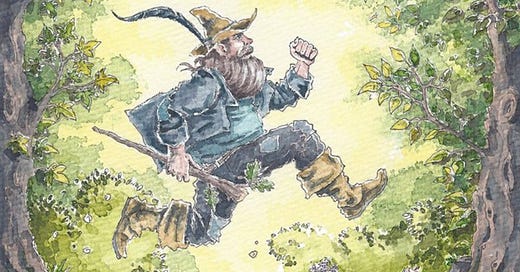Despite their fairly obscure role within the larger legendarium, and the fact that they are entirely missing from the Jackson films, Tom Bombadil and Goldberry are a couple of the most beloved characters by readers of J.R.R. Tolkien, and there is little wonder as to why. When Frodo and his friends enter the Old Forest, they find themselves in the strange world of fairy, in which the trees themselves have wills, long-corrupted with age and the weariness of standing against an increasingly hostile, modernizing world. Old Man Willow gets a hold of the hobbits and seeks to consume them into his trunk of despair, but jolly ol’ Tom Bombadil enters the scene and sings the tree back to its essence, which, among other things, means it no longer eats hobbits.
The enigmatic, apparently-bumbling-yet-wise-and-powerful Tom Bombadil provides the hobbits with an idyllic sanctuary that, at least in some ways, surpasses even the respite of Rivendell or Lothlórien. The elven sanctuaries are free from harm, but they carry the somber sense of a fleeting reality. This is not the case on the house of Tom Bombadil, for “None has ever caught him yet, for Tom, he is the master: His songs are stronger songs, and his feet are faster.” We get the impression that Tom is ever-moving and that the sanctuary he has established with Goldberry is perfectly ordered in accordance with his wise, good, strong songs. Not only is it at peace, but it bears no omen of an immediate doom.
However, this is not first and foremost a post about Tom and Goldberry. For more of this discussion, I encourage you to check out episodes 37 & 40 of the Mythic Mind podcast in which I discuss Tom with C.R. Wiley and Jeremy Kee respectively.
You can’t live in the House of Tom Bombadil.
If you consult Instagram influencers and certain sections of Twitter, you might think the good life consists of living on a farm that is apparently self-sustaining while you engage in philosophy and the arts. There is something truly appealing about this version of faux quasi-monasticism, but it simply is not the world in which we live, or at the very least it is not the world in which we are called to live. Now, perhaps you have the wealth and land to make this a reality, but, for the vast majority of us, such an existence is a fairy land, just as it was for the hobbits. It is a temporary resting place in which we can acquire something that we need for the journey, but it is not itself the destination of our travels. As C.S. Lewis writes in The Problem of Pain, “Our Father refreshes us on the journey with some pleasant inns, but will not encourage us to mistake them for home.”
In his essay, “On Fairy-Stories,” Tolkien makes the point that the world of fairy is neither Heaven nor Hell, but something like the road in between. The world of fairy is where we come to terms with our own transcendent spirit amidst the various glories and temptations experienced in this strange realm. It’s where we get our existential bearings, which in turn equip us to re-enter the mundane world with proper perspective. There is a sense in which the house of Tom Bombadil, which we all desire when we are properly enchanted, is hyper-real and grounding, but it can become a den of sirens if we mistake it for our primary vocation to love our families well, work hard, and put our little realms in proper order. These are the lessons that Tom has for us, which we can bring into our primary world, but Tom’s exact task is not our own.
We have appropriately engaged with the fantastical when our mundane lives become enchanted, meaning they have become more fundamentally what they were always meant to be. When the fantastical becomes mistaken for the mundane while our families and communities fall into disarray, it very well may be that we have been lured into the tomb of the barrow-wights. What this fantastical temptation looks like for each of us may vary, but the result is the same.
Whether in text, film, or social media, never forget your primary-world vocations. Keep moving. Sing your silly songs and save the hobbits from the corrupted wilderness around you. Learn from the house of Tom Bombadil so you can establish your own.
About the Author
Andrew Snyder holds a Ph.D. in theology with a dissertational focus on Søren Kierkegaard’s theology of self-formation. He is an adjunct professor of philosophy and religion, a contributing author to The Holy Spirit and the Reformation Legacy, the host of the Mythic Mind podcast, and the founder of the Mythic Mind Humanities Guild. You can follow him on Twitter @andrewnsnyder and subscribe to his personal Substack on The Letters of J.R.R. Tolkien at Andrew N. Snyder
To join the Mythic Mind Humanities Guild, head over to patreon.com/mythicmind.




